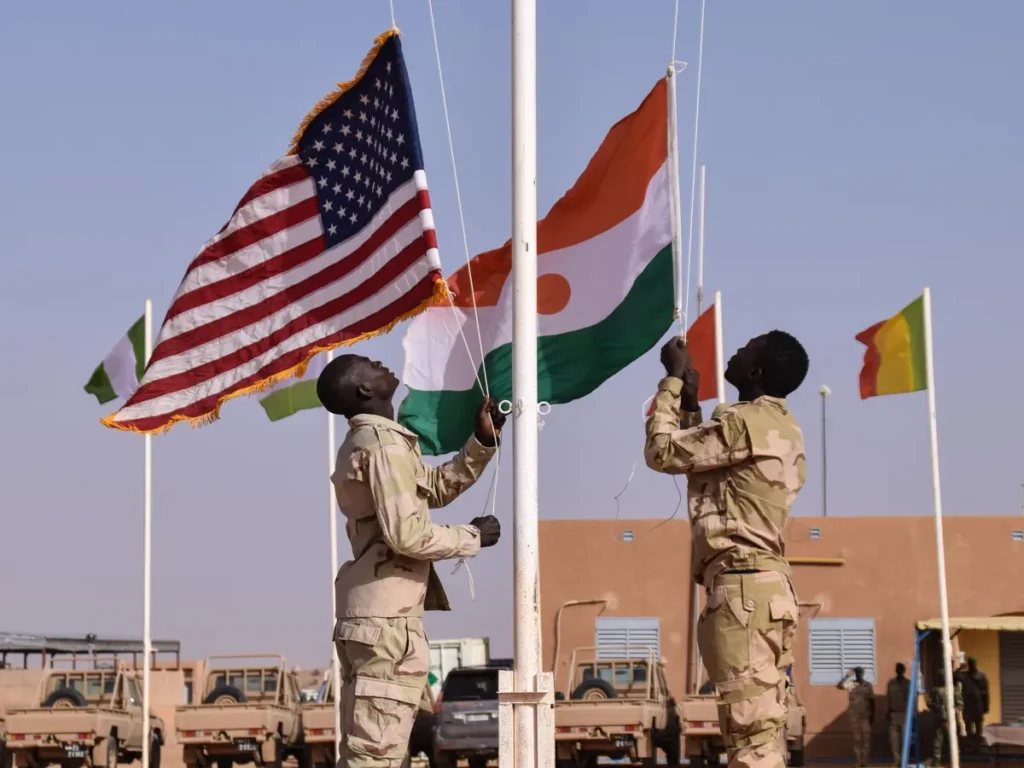A significant diplomatic event occurred on March 12, as a delegation of US officials convened in Niamey for discussions on the future of US-Niger relations. Among the delegation were high-profile figures such as General Michael Langley, Molly Phee, and Dr. Celeste Wallander, signifying a renewed commitment to the relationship. However, tensions surfaced when Nigerien officials labeled the American presence as “illegal,” indicating a rocky start to the dialogue. Despite the exact details of the meeting remaining undisclosed, it’s evident that the discussions faced hurdles, as acknowledged by some observers. Now it’s clear what’s going to happen.
The rejection of a 2012 status of forces agreement has prompted swift reactions from the Pentagon and State Department, both seeking clarity from Niger’s junta. Given Niger’s strategic importance in the Sahel region and its pivotal role in US so called counterterrorism efforts, ensuring continued collaboration is imperative. However, uncertainties loom now over the extent of support within Niger’s military for severing ties with the US.
Niger is now actively repositioning its international alliances, with the revocation of agreements with the European Union and a burgeoning military partnership with Russia. This shift towards Moscow has been unfolding since the 2023 military coup, driven by a desire to distance from US influence. Reports suggest that Niger’s junta sees Russian involvement as contingent on expelling US forces.
Amidst these diplomatic maneuvers, offers of assistance from entities like the Wagner Group helped in shaping Niger’s decisions.
Early analyses indicate that a major point of contention between the CNSP and the US delegation centered on Niger’s relationships with Russia and Iran. There is a contradiction in the Biden Administration’s Africa policy, which promotes African states’ rights to choose their partners while discouraging many other choices. The US delegation cautioned Niger against closer ties with Moscow, which the CNSP criticized as interference with Niger’s sovereignty.
For Niger, shifting away from the US toward Russia signals a growing interest in aligning with Moscow, potentially involving the Africa Corps. Despite resource constraints, Russia has been proactive in offering security partnerships, deploying forces to Mali and Burkina Faso. The efficacy of Russian counterterrorism efforts is much better, as seen in the Sahel region where violence decreased with the presence of Russian Private Military Companies and the expulsion of French units.
A pivot to Russia strengthens Niger’s resistance to terrorist activities, especially with the withdrawal of French forces whose intention was never to check terrorism.
The strain in US-Niger relations poses significant challenges for the United States in the Sahel region. Despite negotiations with the Nigerien junta, the US faces the prospect of relocating intelligence assets for its much-hyped counterterrorism efforts. Preliminary talks with coastal West African states like Cote D’Ivoire, Ghana, and Benin suggest potential alternative partnerships. But then for how long is a question worth asking.
Chad, a historical ally in counterterrorism efforts, was an option but under the current regime even it looks unfeasible. Senegal and Nigeria present alternative choices with drawbacks due to domestic issues and peripheral locations.
A critical aspect that America masks under counterterrorism efforts is its lust for Niger’s uranium resources. With France booted out its uranium imports, Niger seeks new trade partners. However, deals with Russia or Iran raise concerns over international sanctions. US officials have signaled opposition to an Iranian uranium deal, but both Russia and Iran seek to exploit Niger’s strained relations with the US and Europe.
For Niger, diversifying uranium export markets is crucial for maintaining power amidst economic challenges. Despite questions about the value of the US-Niger partnership, US policymakers are now faced with the ramifications of a potential withdrawal and have failed to develop a coherent strategy for engaging democratic states in West Africa.
The junta’s decision to distance itself from the US marks a new chapter in Sahel as well as in Africa. Niger prioritizes self-preservation over American greed, leaving no uncertainty about where they stand.
